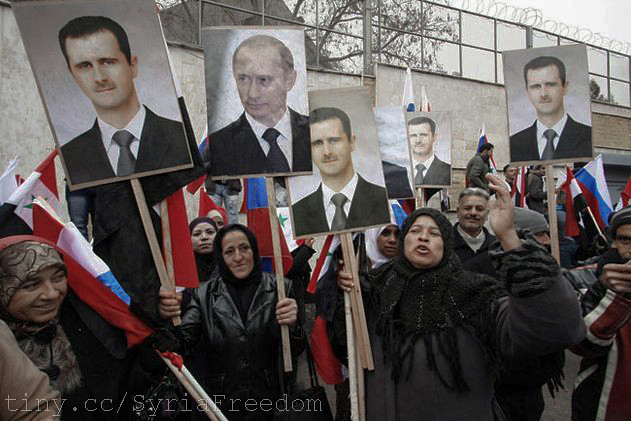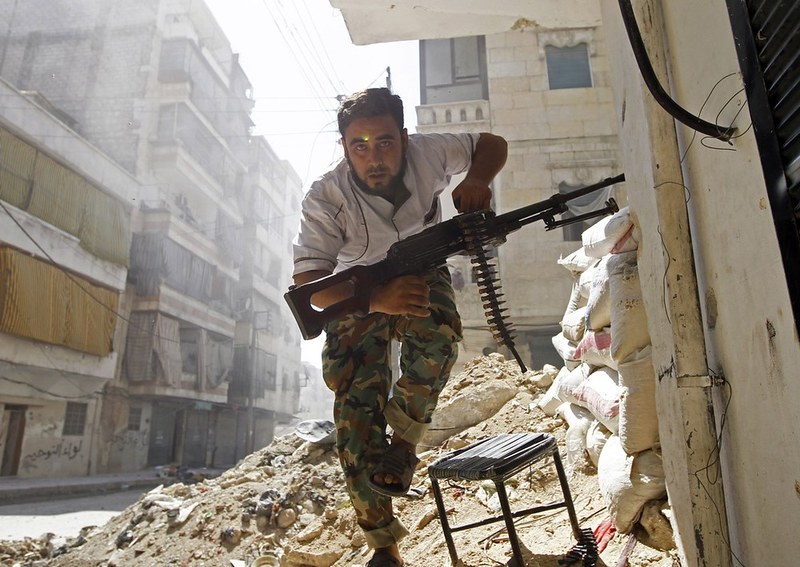On the 30th of September 2015, Russian president Vladimir Putin started a bombing campaign in Syria, having allegedly given the United States only two hours’ warning of its intentions. In the following weeks, much thought and comment has been given to assessing Putin’s motives for this escalation of Russian involvement in Syria. The vast majority of this commentary has been following the established western narrative with regards to Russia, which focuses on the wider geopolitical context and Putin’s efforts to become a more important player in the Middle East. Support for Bashar al-Assad is generally seen in the context of Russia’s – and Putin’s – attempts to shift the global balance of power; often, Russian actions in Syria and the Middle East are considered in the same breath as Russian manoeuvrings in Ukraine, as part of a larger Russian expansionist project. By focusing on the larger geopolitical aspects of Russia’s involvement in Syria they fail to consider the domestic concerns that lie behind much of the Kremlin’s Syrian policy. These concerns, while not independent of a desire to expand Russia’s global influence, hint at opportunities for a more fruitful collaboration with the West than has been the case up until now.
The lack of cooperation that the West – and the United States in particular – had with Russia is because of an inherent western fear, embedded explicitly or implicitly in most of the writing about the Russian bombing campaign that has appeared in the past few weeks, about Russian expansionist ambitions.
Russia sees the maintenance of the Assad regime as a key element in its broader goal of widening its influence in the Middle East. It also sees the turbulence in the region as a major threat domestically in the form of exported Islamic extremism. Refusing to join with the West’s continued championing of the supposed moderate rebels in Syria (although Russia has been advocating for cooperation with the West to combat ISIS), Putin sees Assad not only as the best chance for Russia to establish an influence in the region, but also, more simply, as the best chance for quelling the rising power of extremist groups.
That the threat posed to Russia’s shores by Islamic extremism plays a key role in the Kremlin’s Syrian strategy is clear from the noises that have been coming from Russian media in the months leading up to, and following, the start of the bombing campaign. One radio talk-show hosted a discussion entitled “Syria is our border, which we must not surrender”, while another featured a map of the world as Isis would like to see it in five years’ time, depicting large areas of Russia in black, renamed “Qoqzaz” and “Khurasan.” This fear is borne neither from the paranoia of a leader fearing that his main ally in the region was losing his grip on power, nor from a cynical propaganda machine determined to keep its populace in a state of fear, but a genuine belief that Islamic extremism poses a threat to Russia. ISIS is home to thousands of Russian-speakers, such as Abu Omar al-Shishani, who fought in the Russia-Georgia war in 2008 before joining the extremist group. The fear in Russia, like in many European nations, is that these members will soon return, bringing a rhetoric of extremism with them.
Al-Shishani’s links to the Georgian rebels is, for the Russian authorities, a dangerous example of how continued instability in Syria could bolster Islamic terrorists in the Chechyan region. Deputy Defence Minister Anatoly Antonov claimed in October that “we received confirmation the Islamic State is making contacts with terrorists in Russia’s North Caucasus,” stating that “we will bear this in mind when we make decisions aimed at strengthening Russia’s security and protection of its borders.” Similarly, the president of Russia’s Chechen Republic, Ramzan Kadyrov, declared that “if we think that the Syrian issue will be resolved quickly and will not affect the security of our country, it is not true”, calling for the reinstatement of the death penalty for terrorists as “a supreme measure of social protection.”
Such rhetoric finds weight in the ISIS video message to Putin announcing its plan to invade the Caucasus and southern Russia, and the arrest, at the beginning of October, of a jihadist cell in Moscow for allegedly plotting terror attacks. Revealing the foiled plot, the press office of Russia’s Federal Security Service told Russian news agencies that some of those arrested “had undergone military training in camps of Islamic State terrorists on Syrian territory and arrived in Russia long before the start of Russian military operation in that country,” further feeding Russian fears.
Such fears are not new. Russia is home to at least sixteen million Muslims, and, having stepped up its “anti-extremist” operations before the Sochi Winter Olympics, it has not let up since, while Central Asia plays a far larger role in Russian thinking than many western commentators appreciate. Russia does not require visas from Central Asia, so some experts fear radicalised Muslims from there could come into Russia. Russia had a special unit of border guards at the Tajikistan-Afghanistan border from 1992 until they were removed in 2005, but the recent unrest in Syria has increased concerns about extremist action in Afghanistan as well, leading to intensified Russo-Taijk relations. Earlier this year Russia announced it would supply about $1.2 billion worth of weapons and military equipment to help Tajikistan fend off the Islamist threat, and in October Putin held talks with Tajik President Emomali Rakhmon at which he articulated Russian concerns about situation in Tajikistan in particular, and in the Central Asian region as a whole: “the situation [in Afghanistan] is becoming critical. Terrorists of all flavours are gaining influence there and don’t hide their plans to expand … one of their targets is Central Asia.” In response, he declared that Russia has “to be prepared to respond to this contingency.”
All this provides the background for Russia frustration with what they see as a western insistence on the existence of moderate Syrian rebels. Claims that Britain and the US deliberately allowed World War Two to drag on so that Hitler’s Germany could weaken Stalinist Russia still loom large in the Russian narrative, and many see history as repeating itself in the Syrian conflict. Foreign Minister Sergei Lavrov dismissed the moderate Free Syrian Army as a “phantom”, quipping that “if it looks like a terrorist, walks like a terrorist, if it fights like a terrorist, it’s a terrorist, right?” Such views are finding increased traction outside of Russia as well. Lew Rockwell, President of the Ludwig von Mises Institute in the US, told RT that “there is a lot of evidence that the US had something to do with stimulating [ISIS]” and that it is the purpose of “whatever group of horrible people the US is funding at the moment … to bring about regime change, to totally destroy Syria.” Similarly Peter Ford, Britain’s former ambassador to Syria, told the same station that “virtually all the opposition armed groups in Syrian are Islamist radicals, either ISIS [Islamic State] or interchangeable with ISIS,” and that “the British government has gotten themselves into a situation where they are effectively supporting some groups of jihadists while they are trying to strike other groups of jihadists.”
It is this that has proven to be the sticking point in negotiations between Russia and the West. Whereas the Kremlin sees Assad as the only figure in the region who can ensure stability, and therefore stem the tide of Islamic extremism, the West, and the US and Britain in particular, believe that it was Assad’s actions against his own people that drove people into the hands of ISIS and other extremist groups in the first place, and that any resolution that leaves the Assad regime in power is no resolution at all. However, there is a growing body of opinion, especially amongst European nations, that agrees with Ford when he says that “there is a difficult choice between wishing for the survival of the present government or the deluge or the disaster of the complete Islamist takeover in Syria.” They, like Russia, have watched on as US weaponry has reached groups such as al-Nusra and ISIS, and they have heard those such as Rami Jarrah, a prominent Syrian activist and co-founder of ANA Press, a Syrian news outlet, declare that “there is no such thing as the Free Syrian Army … People still use the term in Syria to make it seem like the rebels have some sort of structure. But there really isn’t.” This meant that Putin’s recent declaration to the UN General Assembly – “do you, at least, realise what you’ve done?” – met with not a few sympathetic ears.
There is no doubt that Russia stepped up its involvement in Syria in order to prop up the Assad regime. But understanding this is only the beginning of understanding Russian interest in the Syrian conflict, and in the wider region. What needs to be understood is why Russia has invested so much in supporting what it insists in calling the legitimate government in Syria. Yes, much of it has to do with a desire to ensure Russian influence in the Middle East; and a crude division of Russian interests into geopolitical on the one hand, and domestic on the other, is clearly unsustainable. Nevertheless, a recognition that domestic concerns do exist, that in supporting Assad the Kremlin is partially expressing its belief that the President is the most realistic means of ensuring stability in the region, would mean that the scope for cooperation with Russia widens. On 16th October, Putin declared that Russia stands for the creation of “as big a coalition to fight the extremists and terrorists as possible,” including “regional partners” like Saudi Arabia, the UAE, Egypt, Jordan and Israel as well as the EU and the US. In the light of over four years of failed attempts to establish peace in Syria, maybe it is time the West took him up on his claims.
Author Biography
Joe Mansour is a history graduate from the north of England. He loves travelling and experiencing different cultures, and it is this that informs most of his work. He is interested in British and US politics, global inequality, and structural barriers to social mobility, and seeks to use his knowledge of history to inform his understanding of current affairs and events. In the future, he wants to go into journalism or public policy, using his writing raise awareness of the problems of inequality societies around the world face.
*Cover image ‘Syrians hold photos of Assad and Putin during a pro-regime protest in front of the Russian embassy in Damascus, Syria‘ by Freedom House










